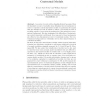Free Online Productivity Tools
i2Speak
i2Symbol
i2OCR
iTex2Img
iWeb2Print
iWeb2Shot
i2Type
iPdf2Split
iPdf2Merge
i2Bopomofo
i2Arabic
i2Style
i2Image
i2PDF
iLatex2Rtf
Sci2ools
CONTEXT
2005
Springer
2005
Springer
Contextual Modals
In a series of recent articles Angelika Kratzer has argued that the standard account of modality along Kripkean lines is inadequate in order to represent context-dependent modals. In particular she argued that the standard account is unable to deliver a non-trivial account of modality capable of overcoming inconsistencies of the underlying conversational background. She also emphasized the difficulties of characterizing context-dependent conditionals. As a response to these inadequacies she offered a two-dimensional account of contextual modals. Two conversational backgrounds are essentially used in this characterization of contextual modality. We show in this paper that Kratzer’s double relative models (with finite domains) are elementary equivalent to well known neighborhood models of normal modalities originally proposed by D. Scott [S] and R. Montague [M]. We also argue that neighborhood models can be also used to represent some (non-normal) graded modalities that are difficult...
Related Content
| Added | 26 Jun 2010 |
| Updated | 26 Jun 2010 |
| Type | Conference |
| Year | 2005 |
| Where | CONTEXT |
| Authors | Horacio L. Arló-Costa, William Taysom |
Comments (0)

